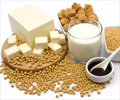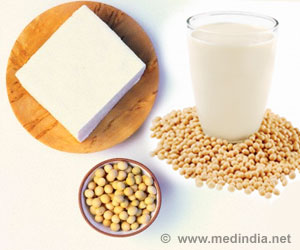Regular consumption of soy can prevent the recurrence of breast cancer. However, introduction of soy after breast cancer diagnosis can increase its risk.
- The beneficial and harmful effects of soy consumption in breast cancer patients have been a longstanding debate.
- The timing of soy’s introduction into a patient's diet can have a positive or negative impact during breast cancer treatment, finds a new study.
- Regular consumption of soy helps build up the immunity against breast cancer and reduce the recurrence.
How Soy Consumption Affect Breast Cancer Treatment
The research team uncovered how the active compounds in soy – isoflavone and genistein - can affect tamoxifen both positively and negatively."The study also mirrors what has been observed in breast cancer patients," said the study's senior investigator Leena Hilakivi-Clarke, Ph.D., professor of oncology at Georgetown Lombardi.
"There has long been a paradox concerning genistein, which has the similar structure as estrogen and activates both human estrogen receptors to a degree. Estrogen drives most breast cancer growth, yet high soy intake among women in Asian countries has been linked to a breast cancer rate that is five times lower than Western women, who eat much less soy," said Hilakivi-Clarke.
"So why is soy, which mimics estrogen, protective in Asian women?"
About 1.67 million women were diagnosed with breast cancer worldwide. More than 70 percent of the breast cancer cases were estrogen-receptor positive. Tamoxifen and other endocrine therapies are the common drugs used for estrogen-receptor positive breast cancers to reduce the ability of estrogen to promote cancer growth. Endocrine therapies are effective in treating breast cancer. However, about half of the breast cancer patients on endocrine therapies exhibit resistance or have cancer recurrence.
Timing of Soy’s Introduction is the Key
The research team used a more advanced rat model of breast cancer and tamoxifen and found that the timing of genistein intake is the critical issue.Consumption of soy-based diet prior to breast cancer development can improve immunity against cancer and reduce the risk of breast cancer recurrence.
"It also inhibits a mechanism called autophagy that would allow cancer cells to survive, which explains why it helps tamoxifen work," added Zhang.
Previously conducted studies have shown no evidence of adverse effects of soy intake on breast cancer outcome. The research team said that Asian and Caucasian women who consumed one-third cup of soymilk daily (10mg of isoflavones) had the lowest risk of breast cancer recurrence.
In the animal model, the research team found that consumption of soy after the diagnosis of breast cancer did not trigger the immune response.
"We do not know yet why this made the animals resistant to the beneficial effects of tamoxifen and increased risk of cancer recurrence," said Zhang.
Animals consuming soy had a 7 percent chance of breast cancer recurrence after tamoxifen treatment, compared with a 33 percent recurrence when exposed to soy only after breast cancer developed.
"We have solved the puzzle of soy and breast cancer in our rat model, which perfectly explains the paradox seen in earlier animal studies and patients," said Hilakivi-Clarke.
"While many oncologists advise their patients not to take isoflavone supplements or consume soy foods, our findings suggest a more nuanced message -- if these results hold true for women. Our results suggest that breast cancer patients should continue consuming soy foods after diagnosis, but not to start them if they have not consumed genistein previously."
Reference:
- Xiyuan Zhang, Katherine L. Cook, Anni Warri, Idalia M. Cruz, Mariana Rosim, Jeffrey Riskin, William Helferich, Daniel Doerge, Robert Clarke, Leena Hilakivi-Clarke. Lifetime Genistein Intake Increases the Response of Mammary Tumors to Tamoxifen in Rats. Clinical Cancer Research, 2017; 23 (3): 814 DOI: 10.1158/1078-0432.CCR-16-1735
















